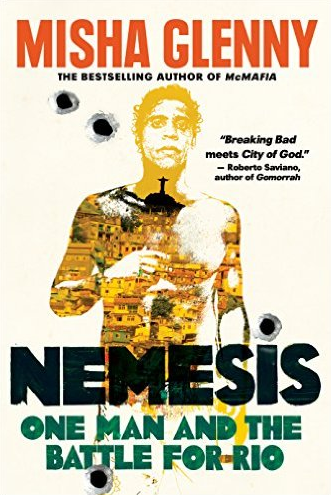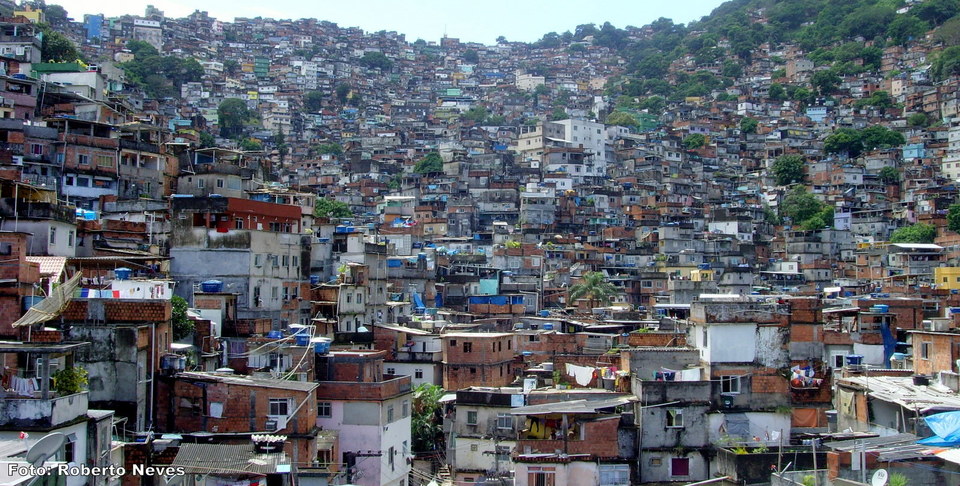
Nemesis: One Man and the Battle for Rio. By Misha Glenny. Knopf (February 9, 2016); 338 pages U$15,00 (Kindle, amazon.com)
As the first week of 2017 has seen repeated bloodshed in an escalating feud between Brazil’s biggest drug gangs, the country’s public debate again focuses on Brazil’s medieval prison system, its controversial drug policies and the growing power of its criminal gangs. While largely seen as a domestic challenge, it cannot be understood without its international dimension, for the vast majority of cocaine (the gangs’ most important source of income) comes from Colombia, Peru and Bolivia. It may not be a coincidence that both of the terrible prison riots took place in regions bordering Venezuela, a failed state awash with weapons. Brazil, for its part, fails to manage its borders and the security threats that emanate from it, related to the smuggling of people, drugs and arms. The country has long turned into a key base for drug traffickers (and the largest crack consumer and second largest cocaine consumer in the world), and several drug gangs are battling to gain control of the most lucrative trading hubs.
There are several excellent books that provide much-needed context to make sense of ongoing events. Tom Wainwright’s Narconomics: How to Run a Drug Cartel (reviewed here) is an excellent introduction to the economics of the drug business. Drugs and Drug Policy: What Everyone Needs to Know, by Mark A.R. Kleiman, Jonathan P. Caulkins and Angela Hawken, though published in 2011, offers a thoughtful and concise summary of the key issues. For those who prefer to read something less wonkish and more dramatic on the matter, Misha Glenny’s Nemesis: One Man and the Battle for Rio is the good way to get started (it is also available in Portuguese). After two books on the global mafia and internet crime, veteran crime reporter Glenny has written a true page-turner about the former drug lord Antônio Francisco Bonfim Lopes, aka Nem, now in a high security prison in Campo Grande in Brazil’s Center-West region, where several interviews took place. While Nemesis is, above all, a biography, it skilfully provides the reader with a much broader perspective, offering an informative and fast-paced analysis of Rio de Janeiro at the time, full of unusual pieces of information. Just like with his previous books, the reader can sense how unconditionally Glenny dives into the subject matter. He does not merely write books, he seems to live them intensely. Despite the occasional exoticization, the author is careful not to romanticize life in the favela.
Nem was born in Rocinha, Brazil’s largest favela, in 1976, part of the last generation to grow up in the absence of systematic violence. In the 1980s, the arrival cocaine would change everybody’s lives forever. Empowered by unprecedented earnings and a systematic absence of the state, the traffickers were able to profoundly change social structures in the slums and assert their power. As the country suffered under hyperinflation and as the new and fragile democratic institutions emerged, the drug business had an easy time filling the power vacuum. As Nem tells the author at some point: “The drugs trade was a necessary evil. Believe me. If it hadn’t been for the traffickers, everyone would have been stealing; everyone would have been killing. We would all have greeted the dawn as dead people. The drugs business occupied the vacuum left by the state. Otherwise this would have been a lawless territory.”

As Glenny writes,
It was during Collor’s first year in office that police in Rio de Janeiro encountered the first semi-automatic weapon, a Ruger 556 manufactured in Connecticut, in the hands of a trafficker from Complexo do Alemão in the city’s North Zone. This was the turning point. Weapons such as the Ruger were infinitely superior to those available to the cops. Drug traffickers were now in a position to become an autonomous paramilitary force, which would eventually transform their capacity for violence into political power.
The impact of cocaine paired with an absence of the state on Brazilian society was dramatic: In 1982, before the illicit cocaine trade had changed the city’s economic and social landscape, Rio de Janeiro’s murder rate was identical to that of New York City: 23 homicides for every 100,000 inhabitants. Seven years later, in 1989, the New York figure was showing signs of a steady decline. In Rio, it had almost tripled to 63 per 100,000. By 1995, with police forces heavily involved in the drug business, the city’s murder rate reached 70.6 per 100,000 inhabitants – not far off Colombia’s death rate at the same time, when the Medellin and Cali cartels were at the height of their power. Rio had turned into Brazil’s most violent city.
Organized crime also flourished in São Paulo. In a section highly relevant to the recent massacres, the authors writes
In stark contrast to the development of factional violence and competition in Rio, there were no serious challengers to the PCC from within São Paulo’s criminal world. Before long, it had started to spread to other states in Brazil, and it also established liaison offices in Paraguay, Bolivia and Colombia. It was on its way to becoming the largest, best-organised and most lucrative criminal syndicate anywhere in the Americas, including Mexico.
Glenny’s book makes clear how the government’s strategy over the past decades has been an abject failure, causing unspeakable human suffering. At one point, he quotes an official who predicts that the death of Rocinha’s leading drug trafficker would assure stability — the exact opposite was true, and the neighborhood descended into months of warfare until a new leader can assert his influence. “If they take me, four or five are ready to take my place”, Nem argues in one of the interviews. The police are depicted as largely corrupt, as some harrowing examples show. In one case, Nem asks his men to turn over a rapist to the police, who ask for a fee of 10,000 reais to arrest him. “What world do we live in when you have to pay the cops to arrest criminals?” the trafficker asks, who, in the late 2000s, presided over Rocinha’s “golden era”, when his management skills and aversion to guns allowed him to dramatically reduce violence in the neighborhood. One drawback of Nemesis is that despite the author’s best efforts, the reader does not get a deeper understanding of the central character of the story. Considering that there are several criminal investigations going on against Nem, that may be too much to ask. Perhaps including the transcripts of the interviews in the annex could have helped shine more light on the man whose demeanour hardly fits his former role as public enemy number one.
While Nemesis includes no specific policy recommendations, Glenny’s account makes it painfully clear to the reader how the War on Drugs has needlessly devastated Brazilian society over the past decades. Just like Mexico, Brazil “(…) paid with the blood of literally hundreds of thousands of men, women and children for a policy of narcotics prohibition which, were it part of a private sector strategy, would have been discarded decades ago as disastrously counterproductive.”
Read also:
Narconomics: How to Run a Drug Cartel
Brazil’s top 10 foreign policy challenges in 2017
How Foreign Policy Can Help Address Brazil’s Violence Epidemic (Americas Quarterly)








